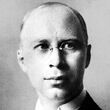Sergei Prokofiev
 From Conservapedia - Reading time: 3 min
From Conservapedia - Reading time: 3 min
Sergei Prokofiev (Sontsovka, 1891 - Moscow, 1953) usually referred to as "Serge" in the West, Russian composer, pianist and conductor. He is considered one of the "greats" of twentieth century classical music. Prokofiev was posthumously awarded the Lenin Prize in 1957 for his Seventh Symphony. [1]
His talent was recognised early. At age 13 he was enrolled at the St. Petersburg Conservatory. At seventeen he made his debut as a concert pianist, playing his own compositions – pieces that were considered difficult to understand, let alone play. At 23 he won the Rubenstein Prize, playing his Piano Concerto No.1, written two years previously.
In 1914 he left Russia, travelled to London, then worked in France, the United States before settling back in France. Initially he had trouble getting commissions accepted, or works performed. Some of his early music was adapted and later appeared under different guises. Much of his music was ahead of its time, but between these works came pieces that can be enjoyed by all, such as the "Classical" Symphony.
He returned to Russia in 1934, settling there permanently in 1936. By this time the various disparate elements of his music were starting to come together. His relationship with his motherland was not always harmonious but his ballet, "Romeo and Juliet" would become a standard.
He retired from public life in 1946 and settled in the country, though he still composed (and was censured along with many of his fellow musicians in 1948 for “…anti-democratic tendencies” (whatever that means) in his music.)
He died in 1953, the same year as Stalin.
His Music[edit]
The following list of works is not complete. Some of Prokofiev's music following his return to Russia in the mid 1930s tends towards the banal pap required by the Soviet system.
- Operas - He wrote 6 operas, all of which have been performed or recorded in recent times and range in style and content from the surreal farce of The Love for Three Oranges (his most popular vocal stage work) to the brutality of The Gambler, the fierce tragedy of The Fiery Angel and the epic War and Peace.
- Ballets – Prokofiev ranks with Stravinsky as one of the two great ballet composers of the 20th century, and wrote 7. His last three are in the repertoire of many major companies. Romeo and Juliet and Cinderella rank with Tchaikovsky’s as classical ballets of the first rank. His last, The Tale of the Stone Flower, is not to that standard, but has charming music, carefully crafted not to upset the Soviet “style manual”.
- Symphonies – There are seven. The first, termed The Classical, is a deliberate throw-back to an earlier time; a neo-classical romp which is performed frequently. His others are deep into the 20th century, and often dark, but melodic and always interesting. They show the two sides of Prokofiev's musical character - the brutal and the lyrical. The fifth and seventh are the most often performed.
- Other orchestral – he wrote 5 piano concertos, 2 violin concertos, a cello concerto (revised as a “Symphony-Concerto”) and a cello concertino - all powerful but frequently lyrical. The 2nd and 3rd piano concertos and the 2nd violin concerto are the most popular. He also wrote an interestingly scored series of dances invoking the Steppes called the Scythian Suite, a reworking of an unsuccessful ballet project during his years in Paris.
- "Film Scores – There are three: Lieutenant Kijé (with its famous troika) later arranged into an orchestral suite; a concert favourite - Alexander Nevsky (with the “battle on the ice” scene that has been borrowed in style and spirit for Hollywood) which became a cantata for mezzo-soprano, choir and orchestra - and Ivan the Terrible.
- Incidental music – he wrote original music for stage productions of Egyptian Nights, Boris Godunov, Eugene Onegan (all by, or created from Pushkin) and Shakespeare’s Hamlet; all in the years directly following his return to Russia, (and all have modern recordings to their name).
- Chamber music – He wrote a wind and string quintet, 2 string quartets, 2 violin sonatas (the second also transcribed for flute) and a cello sonata. The last is the most approachable.
- Piano music – There are 9 sonatas of varying intensity, including the three patriotically inspired War Sonatas, written between 1940 and 1944. There are two series of short pieces with the interesting titles of “Visions fugitives” and “Sarcasms” and other short pieces from early in his career. Much of his piano music is not to be recommended to the unwary.
- Peter and the Wolf – the popular “Fairy tale” (the story is also Prokofiev’s) for narrator and orchestra deserves its own spot – it has been narrated by everyone from rock stars to Shakespearian actors to cross-dressing comedians to Hollywood “icons”. The simple “motifs” for each character, each on a different instrument or section, are a delight.
References[edit]
- The Grove Concise Dictionary of Music p599
- The Oxford Companion to Music pp836/7
 KSF
KSF